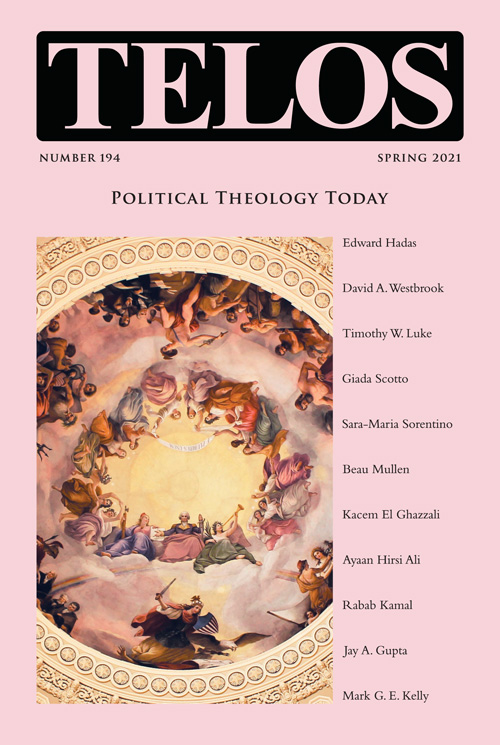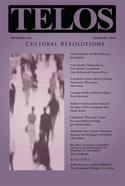By Telos Press · Friday, July 2, 2021 In today’s episode of the Telos Press Podcast, David Pan talks with Beau Mullen about his article “Turmoil in Egypt: Faith, Nationalism, and the Apparent Inadequacies of Liberalism,” from Telos 194 (Spring 2021). An excerpt of the article appears here. If your university has an online subscription to Telos, you can read the full article at the Telos Online website. For non-subscribers, learn how your university can begin a subscription to Telos at our library recommendation page. Print copies of Telos 194 are available for purchase in our online store.
Listen to the podcast here.
Continue reading →
By David Pan · Friday, March 19, 2021 Telos 194 (Spring 2021): Political Theology Today is now available for purchase in our store. Individual subscriptions to Telos are also available in both print and online formats.
 What does political theology mean today? At the Telos-Paul Piccone Institute conference from which many of the essays in this issue originated, a primary goal was to discuss the crisis of secular liberalism and “how faith is reshaping culture and politics today.” But even this project perhaps limits too much the scope of political theology, implying that we have a choice between reason and faith, or that political theology is a commitment to faith rather than an analysis of the element of faith that underlies all of our endeavors. The idea of political theology begins with the premise that every existing human order is built upon some understanding of ultimate meaning. The task would then be to analyze the kind of meaning that each existing order embodies and determine the kinds of decisions about meaning that are made and need to be made at various points in its history. Even secular liberalism, to the extent that it constitutes an existing order, presumes some answer to this question of meaning, and a closer look at the political theology of the United States reveals a mythic dimension that underlies its liberal democratic processes. The essays in this issue examine the political theological underpinnings of economy, politics, technology, and religion, laying out the ways in which these areas of human life develop not as autonomous spheres but as the result of struggles over a set of political theological choices. What does political theology mean today? At the Telos-Paul Piccone Institute conference from which many of the essays in this issue originated, a primary goal was to discuss the crisis of secular liberalism and “how faith is reshaping culture and politics today.” But even this project perhaps limits too much the scope of political theology, implying that we have a choice between reason and faith, or that political theology is a commitment to faith rather than an analysis of the element of faith that underlies all of our endeavors. The idea of political theology begins with the premise that every existing human order is built upon some understanding of ultimate meaning. The task would then be to analyze the kind of meaning that each existing order embodies and determine the kinds of decisions about meaning that are made and need to be made at various points in its history. Even secular liberalism, to the extent that it constitutes an existing order, presumes some answer to this question of meaning, and a closer look at the political theology of the United States reveals a mythic dimension that underlies its liberal democratic processes. The essays in this issue examine the political theological underpinnings of economy, politics, technology, and religion, laying out the ways in which these areas of human life develop not as autonomous spheres but as the result of struggles over a set of political theological choices.
Continue reading →
By Richard Herzinger · Friday, August 23, 2013 The Egyptian military has drowned the already weak hope for a transition to democracy in Egypt in blood. That during the storming of the Muslim Brotherhood’s protest camps, 600 people were killed and snipers fired at unarmed demonstrators cannot be justified by any state declared emergency. The military has thus shown that it is willing to unleash ruthless violence in order to sustain its power interests in ways almost reminiscent of the massacres of the Syrian regime.
Continue reading →
By Reem Bassiouney · Thursday, July 11, 2013 Reem Bassiouney’s “Language and Revolution in Egypt” appears in Telos 163 (Summer 2013). Read the full version online at the Telos Online website, or purchase a print copy of the issue in our store.
 Based on the assumption that language is a social resource, this article contends that during political conflicts, issues of linguistic resources and access to them are disputed. Issues of inclusion and exclusion are predominant. Note that Egypt is a diglossic community, a community in which two language varieties exist each with a different function. Examples are drawn from Egyptian media directly before, during, and after the revolution of January 25, 2011. Two newspaper articles are analyzed in detail, as well as additional material from TV talk shows, films, Facebook pages, and poetry. The first section in this article outlines how linguists in the Arab world at large, and in Egypt in particular, have referred to the diglossic situation to explain and justify negative social and political phenomena, especially the lack of democracy. Section two discusses examples of linguistic manipulation that took place during the revolution and in which the Egyptian state media attempted to cast doubt on the identity and motivations of the protestors in Tahrir Square. The conflict was not one sided, and the Tahrir Square protestors counterattacked the state media through poetry and other means. The main contribution of this section is to show how the diglossic situation is used after the revolution to lay claims on political legitimacy and credibility of the revolutionaries rather than the pro-Mubarak group. In a final section, the concept of linguistic unrest is introduced and defined. Based on the assumption that language is a social resource, this article contends that during political conflicts, issues of linguistic resources and access to them are disputed. Issues of inclusion and exclusion are predominant. Note that Egypt is a diglossic community, a community in which two language varieties exist each with a different function. Examples are drawn from Egyptian media directly before, during, and after the revolution of January 25, 2011. Two newspaper articles are analyzed in detail, as well as additional material from TV talk shows, films, Facebook pages, and poetry. The first section in this article outlines how linguists in the Arab world at large, and in Egypt in particular, have referred to the diglossic situation to explain and justify negative social and political phenomena, especially the lack of democracy. Section two discusses examples of linguistic manipulation that took place during the revolution and in which the Egyptian state media attempted to cast doubt on the identity and motivations of the protestors in Tahrir Square. The conflict was not one sided, and the Tahrir Square protestors counterattacked the state media through poetry and other means. The main contribution of this section is to show how the diglossic situation is used after the revolution to lay claims on political legitimacy and credibility of the revolutionaries rather than the pro-Mubarak group. In a final section, the concept of linguistic unrest is introduced and defined.
Continue reading →
By Samuel Tadros · Tuesday, March 29, 2011 A couple of days ago I was asked about the chances of liberal forces in Egypt after the referendum results. My response was in the negative. The young activists that are often described in the Western media as liberal, democrat, or secular stand no chance in the next parliamentary elections scheduled for next September. My judgment is not only based on the existence, or lack thereof, of those forces or their strength, but also on the nature of the elections system in Egypt and the way the districts are drawn. The overrepresentation of the countryside and the two-candidate district design means that the “liberal” forces only stand a chance in competing in 21 districts out of 222. Even if they win all of those seats, they will represent less than 10% of the members of parliament. Of course some traditional opposition politicians will win elsewhere, but they will totally depend on their family connections in those districts and will run as traditional patriarchal candidates.
Continue reading →
By Gabriel Noah Brahm · Friday, February 25, 2011 In her 1963 book, On Revolution, Hannah Arendt wrote poignantly of the “revolutionary tradition and its lost treasure.” What was this trove of priceless gems and relics, with a noble pedigree few are aware of and without a name? Why was it lost? And what’s this got to do with the events of January-February 2011 in Egypt?
Continue reading →
|
|

 Based on the assumption that language is a social resource, this article contends that during political conflicts, issues of linguistic resources and access to them are disputed. Issues of inclusion and exclusion are predominant. Note that Egypt is a diglossic community, a community in which two language varieties exist each with a different function. Examples are drawn from Egyptian media directly before, during, and after the revolution of January 25, 2011. Two newspaper articles are analyzed in detail, as well as additional material from TV talk shows, films, Facebook pages, and poetry. The first section in this article outlines how linguists in the Arab world at large, and in Egypt in particular, have referred to the diglossic situation to explain and justify negative social and political phenomena, especially the lack of democracy. Section two discusses examples of linguistic manipulation that took place during the revolution and in which the Egyptian state media attempted to cast doubt on the identity and motivations of the protestors in Tahrir Square. The conflict was not one sided, and the Tahrir Square protestors counterattacked the state media through poetry and other means. The main contribution of this section is to show how the diglossic situation is used after the revolution to lay claims on political legitimacy and credibility of the revolutionaries rather than the pro-Mubarak group. In a final section, the concept of linguistic unrest is introduced and defined.
Based on the assumption that language is a social resource, this article contends that during political conflicts, issues of linguistic resources and access to them are disputed. Issues of inclusion and exclusion are predominant. Note that Egypt is a diglossic community, a community in which two language varieties exist each with a different function. Examples are drawn from Egyptian media directly before, during, and after the revolution of January 25, 2011. Two newspaper articles are analyzed in detail, as well as additional material from TV talk shows, films, Facebook pages, and poetry. The first section in this article outlines how linguists in the Arab world at large, and in Egypt in particular, have referred to the diglossic situation to explain and justify negative social and political phenomena, especially the lack of democracy. Section two discusses examples of linguistic manipulation that took place during the revolution and in which the Egyptian state media attempted to cast doubt on the identity and motivations of the protestors in Tahrir Square. The conflict was not one sided, and the Tahrir Square protestors counterattacked the state media through poetry and other means. The main contribution of this section is to show how the diglossic situation is used after the revolution to lay claims on political legitimacy and credibility of the revolutionaries rather than the pro-Mubarak group. In a final section, the concept of linguistic unrest is introduced and defined. 

